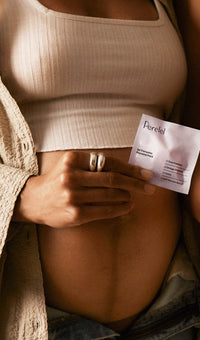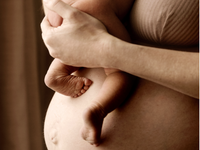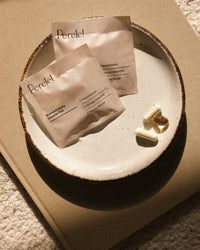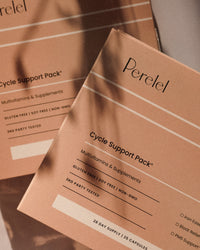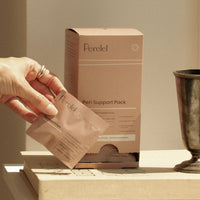Highlights
- Omega-3s are safe and recommended while breastfeeding, supporting both maternal recovery and infant brain and eye development.
- Algae-based DHA and purified fish oil are the most reliable sources, offering clean, tested forms of omega-3 without harmful contaminants.
- Consistency is key here, and supplements help ensure steady levels when diet alone may not be enough.
At Perelel, we know nutrition questions do not stop once your baby arrives; in many ways, they multiply. One of the most common questions we hear is whether omega-3 supplements are safe and beneficial while breastfeeding. The short answer: yes. For both you and your baby, the right omega-3s can be an essential part of postpartum care.
Our team of world-class specialists and doctors designed Perelel’s postpartum routines with this in mind. Omega-3 fatty acids support your recovery while also nourishing your baby’s brain, eyes, and nervous system. But not all sources are created equal, and dosage matters.
Here is what you should know.
Why Omega-3 Matters After Birth
Omega-3 fatty acids are a family of healthy fats that play critical roles in the body. The two most important for postpartum health are DHA (docosahexaenoic acid) and EPA (eicosapentaenoic acid).
For nursing mothers, omega-3s help support the body’s natural management of inflammation, support mood balance, and maintain heart and joint health. For babies, DHA in particular supports brain growth, vision development, and the nervous system during the first year of life. Since your baby relies on your breast milk for nutrients, what you consume directly affects them.
Is Omega-3 Safe While Breastfeeding?
Yes. Leading medical organizations, including the American College of Obstetricians and Gynecologists (ACOG), recommend omega-3 supplementation for women who are breastfeeding.
The key is choosing the right type and source.
- Safe and recommended : DHA and EPA from fish oil or algae.
- Avoid in excess : Avoid certain fish that are high in mercury, such as king mackerel, shark, swordfish, and tilefish. Mercury can pass through breast milk and pose risks to infant development.
By selecting high-quality supplements, you get the benefits of omega-3s without the contaminants.
Best Sources of Omega-3 While Nursing
After establishing omega-3 as important in your postpartum vitamin routine, the next step is figuring out where to get it. Food can provide some, but with the demands of new motherhood, many women find supplements are the most consistent way to meet daily needs.
Here are the top sources worth considering:
- Algae-based DHA: A clean, plant-based source ideal for mothers who prefer vegetarian options. It is also free from common contaminants found in fish.
- Purified fish oil: When responsibly sourced and third-party tested, fish oil is a reliable way to get both DHA and EPA.
- Food sources: Salmon, sardines, trout, and chia or flax seeds all provide omega-3s, though amounts can vary.
Omega-3 in Perelel’s Postpartum Support
We included high-quality omega-3 into our Mom Multi Support Pack, because we believe postpartum care should be comprehensive and simple. Each daily sachet includes doctor-recommended DHA alongside essential nutrients like iron, vitamin D, and probiotics to support recovery, energy, and lactation.
Instead of juggling bottles and labels, you get a streamlined, doctor-formulated solution designed to meet you where you are.
Frequently Asked Questions
When should I start taking omega-3 supplements?
You can begin during pregnancy and continue through breastfeeding. Maintaining a steady intake ensures you build your own nutrient stores while also supporting your baby.
How much omega-3 should I take while breastfeeding?
Most experts recommend at least 200 to 300 mg of DHA per day while nursing. Exact needs may vary, so talk with your healthcare provider about what is best for you.
Do I still need omega-3 if I eat fish regularly?
Yes. While fish like salmon and sardines are good sources of DHA and EPA, intake can vary week to week. A supplement helps ensure consistent levels without the risk of mercury from higher-contaminant fish.
The Takeaway
Taking omega-3 while breastfeeding is not only safe but recommended. DHA and EPA support your recovery and provide critical building blocks for your baby’s brain and eye development. By choosing clean, bioavailable forms, you ensure both you and your baby get the benefits without the risks.
At Perelel, we make this simple. Our doctor-designed postpartum routines include omega-3 in the recommended dose, backed by clinical expertise and rigorous third-party testing. Because you deserve trusted care, and your baby deserves the best start.
Sources:
Omega-3 Fatty Acids & the Important Role They Play | Cleveland Clinic




